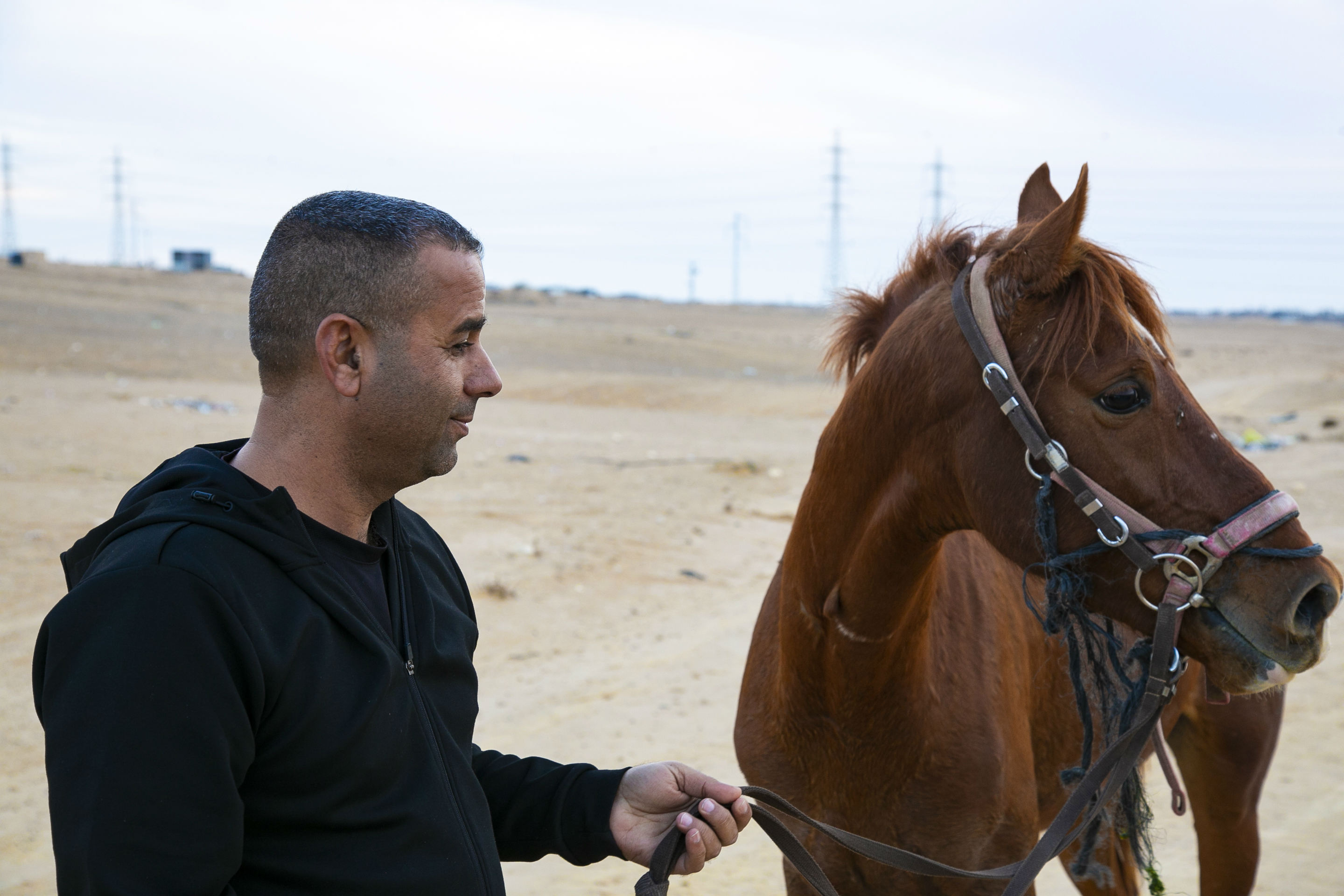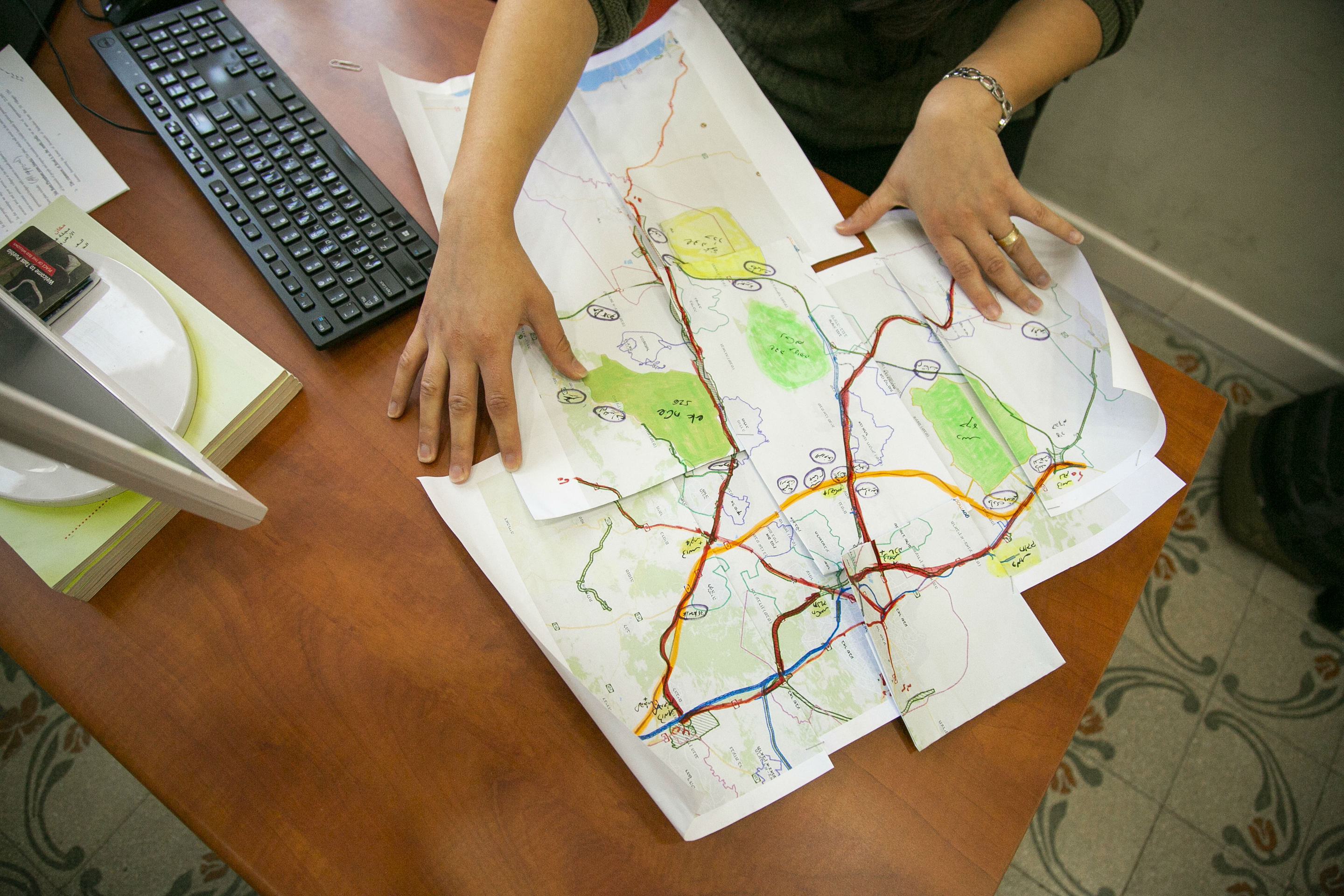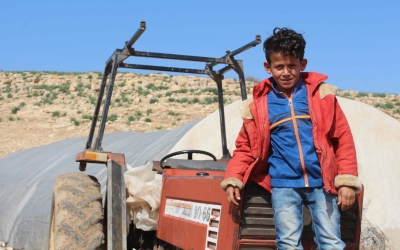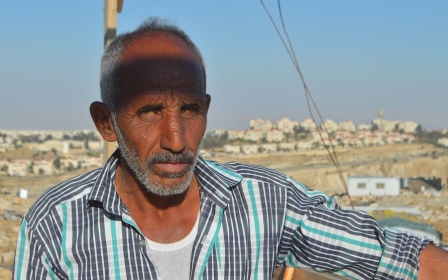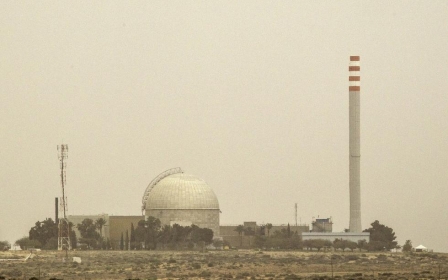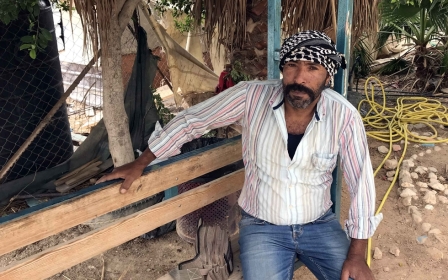‘We will only be moved as bodies’: Israel and Bedouins face off in the Negev
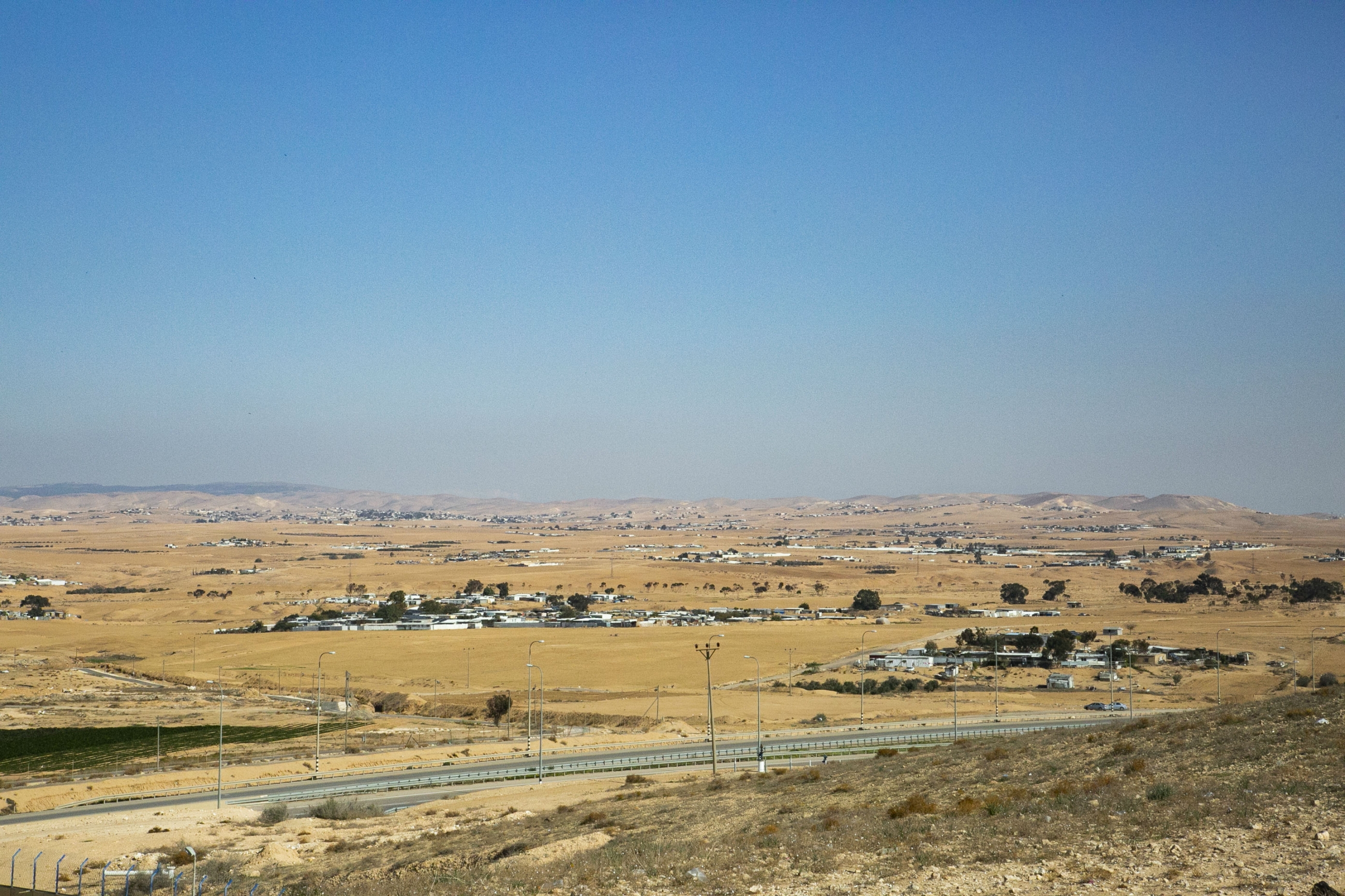
Mohammad Danfiri stands at the edge of his Bedouin family’s sheep enclosure in the Negev Desert, looking out at a pair of cell phone towers at the top of a nearby hill. They are situated in an open spot between one end of his village and the other - an area, he explains, where an extension of Israel’s major eastern highway will be built.
A row of houses stands about 60 metres from the towers, where highway plans have been approved. But the Israeli government is advancing plans to evict not only the residents closest to the planned road.
The entire 5,000-person village - and many surrounding ones - will be placed in temporary housing units under the government’s plan, severely limiting their ability to herd sheep and develop agriculture, the primary means of employment in Bedouin communities.
'It's not going to happen… A project like this would erase the Bedouin culture and heritage'
- Mohammad Danfiri
Danfiri is one of at least 36,000 Bedouins in Israel’s Negev (known in Arabic as the Naqab) facing eviction due to a host of projects like the highway expansion.
In order to implement these development plans put forth by government bodies, the Israeli military, private companies and non-profit groups, Israel’s Bedouin Development Authority - the governmental body responsible for handling interactions between Bedouins and the state - is aiming to move tens of thousands of people into short-term housing.
New MEE newsletter: Jerusalem Dispatch
Sign up to get the latest insights and analysis on Israel-Palestine, alongside Turkey Unpacked and other MEE newsletters
Bedouins refer to the temporary housing as “caravans”, as they are small mobile homes that Israel intends to host whole families. In October, an Israeli district planning committee began to deliberate on whether to approve these transfer plans.
The residents facing displacement live in villages the government deems “unrecognised”, though most have lived on or near the land since the country was established in 1948. During the past 50 years, Israel has attempted to move Bedouins into “recognised” communities, repeatedly arguing that those in unrecognised areas have no claim to the land.
Unrecognised villages are denied any infrastructure or support from the government. There are no means of transportation, no roads, no schools, and Israeli authorities don’t accept or negotiate with their local leadership.
As a result, the communities live a bare-bones life in a harsh terrain. Many herd sheep to sell meat products. Some are able to get work at nearby Israeli companies.
'No solution'
Danfiri, 47, remembers growing up in the village with the only water source being a well that collected rainwater. He and his friends would bring up the water, and his mother would use her scarf to drain out the dirt. On Fridays, adults would hook up a television to a car battery to watch cartoons and Egyptian movies.
"Kids today have everything,” Danfiri says, referring to the solar panels that are now built on top of many Bedouin houses. “Fridges, internet, everything is available on the spot."
Danfiri said in order to protect the lifestyle of his community, Bedouins will reject the government’s transfer plans. If they absolutely have to move, he says, they’ll shun the “caravans” and stay as close to their original homes as possible – even if that’s right next to a construction site.
"We're not moving, we're going to fight it,” he says. “It's not going to happen… A project like this would erase the Bedouin culture and heritage."
For a community that defines itself around a traditional, agriculture-based lifestyle, the planned evictions are seen as the latest move in a decades-long government campaign to concentrate them into specific areas. For people like Danfiri, that means giving up part of their identity.
“Everywhere I go, the thing I'm most proud of is being Bedouin. Specifically in the unrecognised villages, Bedouins much more preserve traditional culture,” he says.
Adalah, a Haifa-based NGO that focuses on legal rights for Arabs in Israel, opposes the plans on multiple grounds. For one thing, the organisation argues, the planned housing units aren’t fit for occupancy under the law because they don’t have adequate infrastructure and spacial standards.
'To us it means they have no solution for the people they are planning to evict'
- Myssana Morany, Adalah attorney
The NGO also published a white paper last month arguing that the plans constituted a “separate but equal” approach to Israeli citizens in the Negev.
“One system relies on a planning network that works for the benefit, well-being and future development of Israeli Jewish citizens and communities, and places the Israeli Jewish citizen at the centre of the process,” it wrote.
“The second system relies on a planning network that seeks displacement and transfer of Bedouin citizens to temporary housing, and subordinates the entire Palestinian Bedouin population to an oppressive reality without their consultation.”
Adalah also argues that the plan will increase poverty among Bedouins who are evicted and those who live in the communities where the camps will be built, because it can harm both groups’ access to work.
Myssana Morany, an attorney with Adalah, says it’s not clear how quickly the plans will be carried out and how many people will be moved in the end. Because the government’s wording was vague in the plans they filed, she says, it reveals a broader plan that could affect up to 80,000 people. Similarly, the lack of a specific number of housing units means the government can evict as many people as it would like to.
“To us it means they have no solution for the people they are planning to evict,” Morany says.
Hussein El Rafaiya, a 58-year-old from an unrecognised village called Birh Hamam, served as the head of a council that represents the unrecognised villages from 2002 to 2007. Israel doesn’t recognise the council’s authority and doesn’t negotiate with it.
Rafaiya pointed to historical examples of Israeli pressure on Bedouin communities to force them away from their homes, like decades of home demolitions and evictions by the government.
“We have no possibility of addressing the situation through the courts or the laws,” Rafaiya says, explaining that Israeli law simply doesn’t recognise Bedouin claims to the land or housing.
“This is not the behaviour of a state: it's criminal behaviour… All these efforts weren't effective enough in the eyes of the Bedouin Authority, so they decided to create these temporary displacement camps.”
In early 2020, Israel’s southern district planning committee will decide whether to move forward. The government’s two temporary housing plans emphasise the need to “urgently” evict Bedouins on the basis of development projects. In the eyes of human rights groups, it’s a way to come up with a fast but ineffective legal solution in order to evict people.
Expanding presence
In recent years, the Israeli military has moved bases to the Negev in an effort to expand the military and industrial presence there, and as a way to increase the population. The government has also invested resources into helping the south’s largest city, Be’er Sheba, rebrand itself as a hub for technology and entrepreneurship.
The Negev has become a home to a wide range of projects, including solar farms, power plants, greenhouses and other industrialisation efforts. The government has expressed interest in supporting the cultivation of medical marijuana crops, manufacturing and cyber defence, all through the use of grants and subsidies.
The idea, according to the state’s Ministry of Economy, is to compete with Silicon Valley.
One of the key players in this process is the Jewish National Fund (JNF), a US- and Jerusalem-based organisation that is granted special governmental authorities by the Israeli government to purchase and develop land for Jewish settlement.
It oversees many projects across the region, often clearing massive expanses of land to build forests. Some unrecognised Bedouin communities are in areas marked for eviction due to JNF projects.
On the JNF’s website introducing its Negev blueprint, it outlines a plan to settle 500,000 people from elsewhere in the region.
“The Negev Desert represents 60 percent of Israel’s landmass but is home to just 8 percent of the country’s population,” it wrote. “And in those lopsided numbers, we see an unprecedented opportunity for growth.”
The JNF’s “Blueprint Negev” plan features a prominent priority to support Bedouin communities in the region, but it only lists partnerships with recognised Bedouin towns.
A JNF spokesperson did not respond to an emailed request for comment.
Thabet Abu Rass, the co-director of Abraham Initiatives, an NGO focused on political rights in Israel, said he disagreed with the government’s plan primarily because it doesn’t take into account any of the Bedouin community’s needs.
“It’s a different terminology of uprooting people. The problem here is uprooting people,” Rass said.
“The government of Israel is investing a lot of money in planning. In one point, it’s good to plan for people, but on another point, it’s not good to plan against their will… the Bedouins have nothing to say about it.”
'Israel is defining itself as a Jewish state, and it’s important for them to control more and more land'
- Thabet Abu Rass, co-director of Abraham Initiatives
Rass recalled multiple instances where the Israeli government has made plans for the Negev without consulting the Bedouins, and without accepting or even addressing their claims to land.
“The issue of land in Israel is ideologically motivated,” Rass said. “Israel is defining itself as a Jewish state, and it’s important for them to control more and more land.”
For Rafaiya, the plans are simply unacceptable. Bedouins from recognised communities won’t move, he said.
“This plan is a disaster for us,” Rafaiya says. “The state can come and demolish houses and communities. But we will only be moved as bodies, we will be buried on our land."
This article is available in French on Middle East Eye French edition.
Middle East Eye delivers independent and unrivalled coverage and analysis of the Middle East, North Africa and beyond. To learn more about republishing this content and the associated fees, please fill out this form. More about MEE can be found here.


